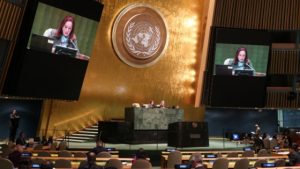– As delivered –
Statement by H.E. Mrs. María Fernanda Espinosa Garcés, President of the 73rd Session of the UN General Assembly
18 October 2018

Impact of the rapid technological change in the achievement of the SDGs
Excellencies, distinguished delegates,
Technological change is rapidly changing our present and our perspectives for the future.
Facing this substantial and accelerated transformation in history, academics, scientists, the private sector, civil society and governments have focused on taking on the opportunities, challenges and threats that it represents.
Our Organization must also be an active part of this conversation, which for many is “the most important conversation of our time”.
The impact that technological changes have on each of the SDGs that we have established is a fact.
If we want to be efficient, we must evaluate which are the technological changes that will allow us to accelerate the fulfillment of the goals of the 2030 Agenda and those that could jeopardize its achievement.
The contributions of this session are aligned with the goals of the agenda.
I will focus on three points that I consider to be crucial.
First: the impact on the future of work.
If we want to achieve the goal of full and productive employment and decent work for all, we must create 600 million new jobs by 2030.
This rapid technological change affects jobs. According to some estimates, automation would eliminate 75 million employments by the year 2022, but would also create 133 new job opportunities.
Therefore, we must set in motion adequate strategies and policies that will help people adapt and make the most of the benefits of these new job markets. Women and girls must, of course, be included in these plans.
Second: the potential of the rapid technological change in the context of climate action, specifically, to make progress in low carbon technologies.
We must accelerate the development of these technologies if we want to achieve the goal of limiting global warming to 1,5 degrees Celsius, as established in the Paris Agreement, and in light of Goal 13 of the 2030 Agenda.
The recent report issued by the Intergovernmental Panel on Climate Change reminds us that, if we act collectively and responsibly, we will be able to achieve the commitments of the Paris Agreement; it also alerts us to the dangers that humanity will face if we do not.
A technological evolution can contribute to the creation of clean energy sources that are affordable for millions of people who are currently lacking an energy source.
Third and last point: the Organization must continue to address the topic of rapid technological changes while maintaining the wellbeing on people at the core of its deliberations.
Technological progress has the potential of transforming the lives of everyone in a positive way, but it is also critical that progress is affordable for everyone. Otherwise, the rapid technological change could increase inequality and push us away from Goal 10 of the 2030 Agenda.
A clear example of this are digital technologies. Despite its quick expansion, only 48% of the world’s population can have access to the Internet. The digital gap that continues to exist among countries is in fact an obstacle for sustainable development.
Another challenge associated to the digital era is protecting the people’s right to privacy.
I would like to point out that certain technologies that are still under development, such as artificial intelligence or machine learning, require robust regulatory frameworks in order to face the challenges and risks that their use represent for the future of humanity.
Technological progress has the potential of transforming the lives of everyone in a positive way, but it is also critical that progress is affordable for everyone.
Excellencies,
Technological change forces us into an unprecedented transformation. Our Organization cannot remain on the sidelines of this paradigm shift.
Under this premise, I am sure that we will be able to comply with our multilateral commitments for present and future generations.
Thank you.
 Making the United Nations Relevant to all People
Making the United Nations Relevant to all People